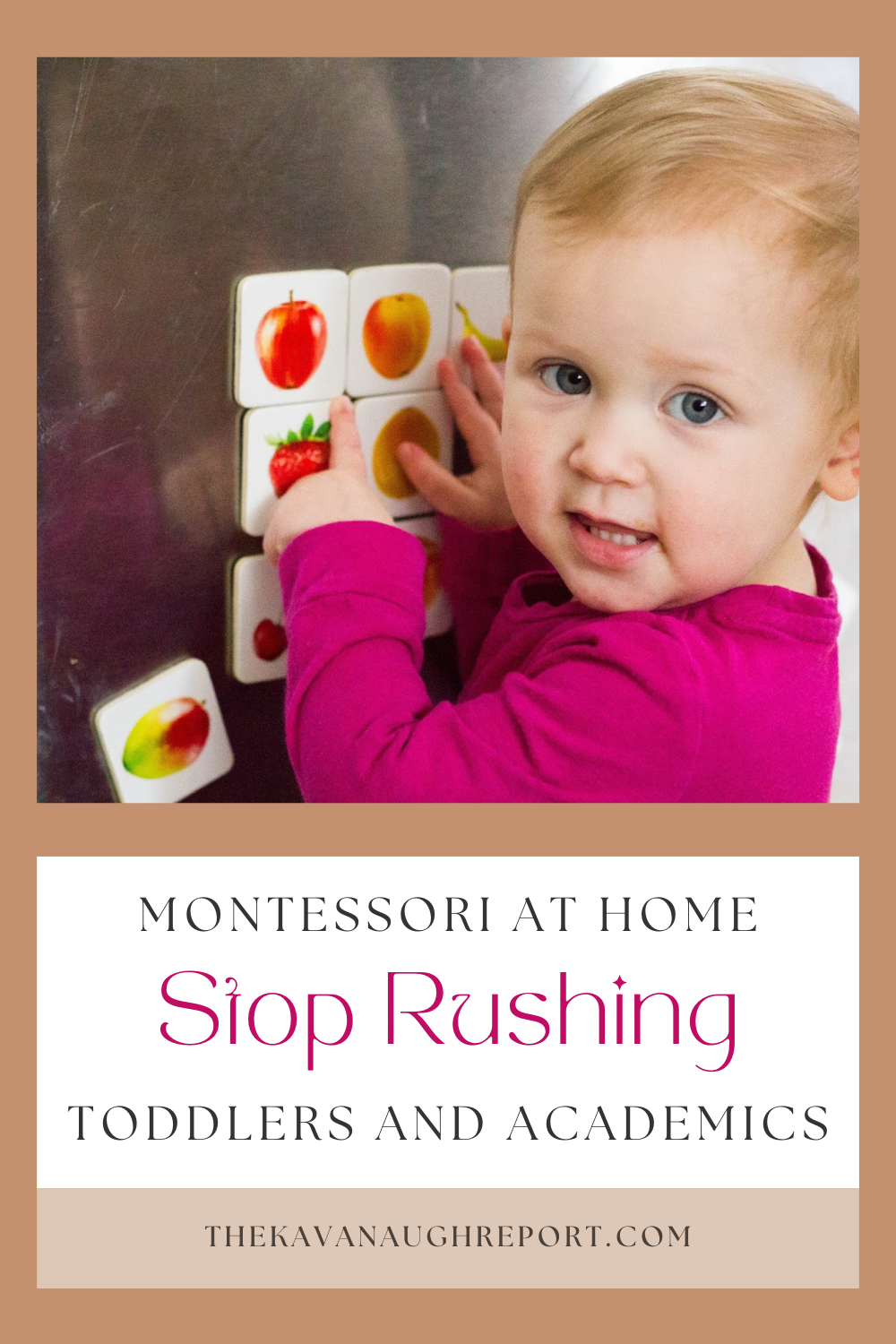We live in a fast world. I can order food online and have it delivered to me an a matter of minutes all without ever interacting with anyone. It's that fast. In a matter of seconds I can look up any information I've ever wanted or needed to know.
This speed creates a certain pressure. Have you felt it? There's a pressure to keep up, to move at lightening speed, to skip steps and make leaps. The same is becoming true for other aspects of life -- for child rearing and education. Kindergarten is the new first grade; preschoolers are the new kindergartners; toddlers are the new...
Well, what are toddlers? Still toddlers! But, yet still they face all the pressure to push academics. To teach toddlers ABCs, to teach them to count. There's a rush to teach them all these abstract concepts. I know I feel it. There's an expectation that they be working toward a goal. That they become little people capable of regurgitating facts and sayings. "What color is this!? How many are there?! What letter is this!? What sound does that animal make!?"
Montessori Parents: Can we all agree to stop?
I will stand up and admit that with Henry I pushed these things. Through tot school, I was introducing academic concepts with him from an early age. But, if I could go back I wouldn't have taken that approach.
Things are different this time. I'm not going to bow to this mainstream pressure. I'm going to resist it -- tooth and nail. I'm not going to skip steps. I'm going to save the mystery of preschool for preschool.
In the words of Maria Montessori (from The Absorbent Mind):
"By the age of three, the child has already laid down the foundations of his personality as a human being, and only then does he need the help of special scholastic influences."
So, before three, have other more important work than scholarly work.
So, what should Montessori toddlers be doing if not academics?
- Talking to your child (there's a reason they follow you around all day!)
- Reading to your child
- Providing opportunities for classifying, creating order and matching. These skills are the foundation for understanding abstract concepts later.
Toddlers need to develop their hands and bodies through movement. They need to be given opportunities for exploration of concrete materials. Things that challenge their little muscles and their big ones! They are wiggly and uninterested in sitting still for a reason. They have to figure out how they work. This looks like:
- Lots of maximum effort work
- Lots of sensory exploration
- Lots of free movement
Materials, little trays and even toys can come later. They are driven to move. We can give them the respect and space to allow them to explore. "Play is the work of the child." Maria Montessori And we can trust that it is through this movement that they are learning and growing. Movement is how people are driven to learn and as toddlers move in their environment their wonderful brain is soaking in all of the things around them.
{In these pictures, Nora uses wooden fruit magnets. (Similar) Exploring the shapes and asking me the names.}
They are also driven to the practical. They learn from watching. And you are their constant teacher. Are you sitting around scooping beans? No, not likely. Are you scooping in the garden, the kitchen? Yep! And that's where they ultimately want to be. We can give them the tools to make it happen. This can be through physically giving them child sized tools to explore, or just by opening up the opportunities to engage in real work around the home.
So, next time your toddler won't sit for hours working on little trays or work, won't count to 10 for you, or shows no interest in art projects, remember they aren't built for that. Stop rushing your toddler. Next time you want to quiz your toddler on the letters of the alphabet, just wait. Know that they have more important work to do! Follow your child, let their interests lead you and enjoy them while they are little!
Have you found yourself rushing your toddler toward academics? Do you disagree with me?
If you liked this post, don't miss: Meaningful Choices for Babies and Toddlers; Toddlers & Dumping: Why do Toddlers Dump Everything?
---
---







